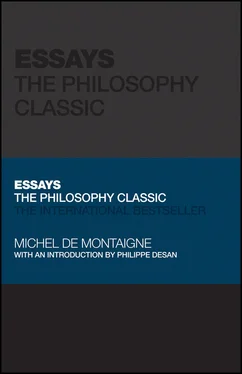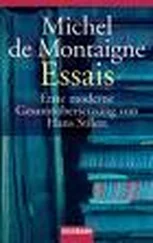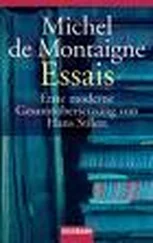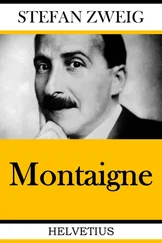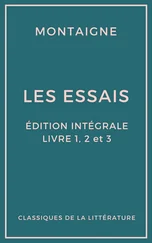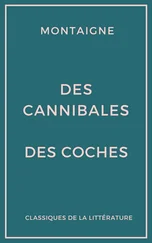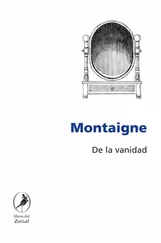Michel de Montaigne - Essays
Здесь есть возможность читать онлайн «Michel de Montaigne - Essays» — ознакомительный отрывок электронной книги совершенно бесплатно, а после прочтения отрывка купить полную версию. В некоторых случаях можно слушать аудио, скачать через торрент в формате fb2 и присутствует краткое содержание. Жанр: unrecognised, на английском языке. Описание произведения, (предисловие) а так же отзывы посетителей доступны на портале библиотеки ЛибКат.
- Название:Essays
- Автор:
- Жанр:
- Год:неизвестен
- ISBN:нет данных
- Рейтинг книги:3 / 5. Голосов: 1
-
Избранное:Добавить в избранное
- Отзывы:
-
Ваша оценка:
- 60
- 1
- 2
- 3
- 4
- 5
Essays: краткое содержание, описание и аннотация
Предлагаем к чтению аннотацию, описание, краткое содержание или предисловие (зависит от того, что написал сам автор книги «Essays»). Если вы не нашли необходимую информацию о книге — напишите в комментариях, мы постараемся отыскать её.
Essays: The Philosophy Classic
Essays: The Philosophy Classic
Essays — читать онлайн ознакомительный отрывок
Ниже представлен текст книги, разбитый по страницам. Система сохранения места последней прочитанной страницы, позволяет с удобством читать онлайн бесплатно книгу «Essays», без необходимости каждый раз заново искать на чём Вы остановились. Поставьте закладку, и сможете в любой момент перейти на страницу, на которой закончили чтение.
Интервал:
Закладка:
The various political and religious crises that punctuated the second half of the sixteenth century called into question a morality that was now discredited and obsolete. In short, utility replaced honesty. Montaigne offers an excellent analysis of this moral crisis in “On Profit and Honesty” (III, 1). In this chapter written after 1585, he shows how bourgeois values gradually replaced noble values such as honor, frankness, loyalty, good faith, and moral transparency. Past behaviors no longer exemplified moral models, as personal profit was now established as the only rule of behavior. Montaigne is the witness of this ideological transformation – anchored in historical and economic developments – which sees honor and truth replaced by utility, success, and personal experience. It is perhaps a weaker path “which is a means much more weak and cheap; but truth is so great a thing that we ought not to disdain any mediation that will guide us to it” (III, 13).
The reappraisal of the notion of truth is obviously influenced by Montaigne's personal experiences. They leave him with a feeling of a permanent relativism which no longer allows him to judge anything in a lasting way. In a time when the vicissitudes of religious conflict seemed to govern everything, it makes sense to doubt what education has transmitted to you. In place of eternal values, a new truth has emerged: the truth of those who came out victorious.
Rather than commenting on the political, religious, and social situation of his country, Montaigne takes refuge in personal introspection. It replaces the rhetorical demonstrations of which he was always suspect. Morality is shaped by the military actions of clashing religious forces. Doubt then becomes a natural reflex at a time when all humanist benchmarks are systematically destabilized. The truths of yesterday crumble and the sandy soil upon which philosophy was built suddenly opens. The end of the Renaissance is a yawning abyss that engulfs past practices and knowledge, leaving only the necessity of doubt.
CONCLUSION
To summarize: The famous “the world eternally turns round” evoked by Montaigne no longer allows man to impose on others received knowledge or to claim possession of universal truths. The skeptical attitude which characterized the end of the Renaissance, and of which Montaigne is one of the best examples, was essentially due to an ideological and moral crisis linked to the experience of the wars of religion. In the second half of the sixteenth century, skepticism cannot be conceived of as a philosophical system; it rather a simple reaction to events – a response to a moral crisis which no longer allowed one to have ready-made answers.
The implication, which was clear to Montaigne, was that the truth could no longer be taught; it had to be discovered by the individual subject. In matters of authority, everything was now up for grabs. Far from being received, truth must now be conceived individually from unique and private experiences. Montaigne was for this reason outside any didactic scheme: “so many interpretations dissipate truth and break it” (III, 13). He further concedes that “example is a vague and universal mirror, and of various reflections” (III, 13) and therefore loses its exemplarity. This is why Montaigne systematically deconstructs models to reduce them to specific cases.
At this time of crisis in political, social, and religious authority, the best reasoning comes from seeing what is in front of our eyes, rather than looking for guidance from previously celebrated universal truths. As Montaigne writes in his chapter on Raimond Sebond:
“I always call reason that appearance or show of discourses which every man devised or forged in himself: that reason, of whose condition there may be a hundred, one contrary to another, about one self same subject: it is an instrument of lead and wax, stretching, pliable, and that may be fitted to all biases and squared to all measures” (II, 12).
Skepticism towards the religious and political situation relegates Montaigne to the role of a passive observer. He reports without judging, at least in a vindictive way. His approach of a “middle path” was aptly called politique (as the term was defined in the 1570s and 1580s), namely a compromise and juste milieu between extreme positions.
In the end, the Essays analyze what can be broadly defined as human nature, the endless process by which people attempt to impose themselves and their opinions upon others through the production of laws, policies, or philosophies. For Montaigne, this recurring battle for “truth” needs to be put into a historical perspective:
“The truth of these days is not that which really is, but what every man persuades another man to believe” (II, 18).
Montaigne's famous motto, “What do I know?” (inscribed above the fireplace in his study), is a question that always needs to be asked, even when others give us ready answers.
In summary, reading him today teaches us that the angle we have defines the world we see. Or, as he wrote: “it does not only import that we see the thing, but how and after what manner we see it” (I, 40).
NOTE ON THE TRANSLATION
For this edition we have used Charles Cotton's translation. Cotton (1630– 1687) was considered one of the “most charming” poets of the late seventeenth century. In 1667, he translated the Moral Philosophy of the Stoics by Guillaume Du Vair and, a few years later (1671), Horace by Corneille.
Published in 1685, Cotton's translation of the Essays is dedicated to George Savile, Marquis of Halifax. Almost a century after John Florio's first translation of the Essays in English, Cotton's language reflects the taste of his time. His prose is simple, clear, less flowery, and certainly more exact than that of Florio or other writers of the Renaissance. His translation enjoyed some popularity through the eighteenth century considering the large number of reissues (1693, 1700, 1711, 1738, 1743, 1759, 1760). Close to Montaigne's original language, this translation (which we have modernized slightly, removing some archaic words) remains very readable today. It includes some of Cotton’s remarks and references, along with those of a later editor, William Carew Hazlitt. There are also remarks from the translator of a 1724 French edition, Peter Coste. All these notes are in square brackets, as distinct from the regular brackets used by Montaigne himself.
As a complete edition of the Essays would run to over 1200 pages, most modern editions are selected. We have chosen 11 out of 57 chapters from Book I, 8 out of 37 chapters from Book II, and 7 out of 13 chapters from Book III. Although the unavoidable and best known chapters such as “To Study Philosophy Is to Learn to Die”, “On the Education of Children”, “On Friendship”, “On Cannibals”, “On Books”, “On Repentance”, “On Coaches”, “On Vanity”, and “On Experience” are present in this edition, we have also selected less known chapters which are often kept out of the Montaignian canon but nonetheless seem relevant for the twenty-first-century reader.
MICHEL DE MONTAIGNE – TIMELINE
Born in 1533, the son of Dordogne landowner Pierre Eyquem, and Antoinette de Louppes. Her family is Christian but descended from Sephardic Jews.
Receives excellent education at the College de Guyenne in Bordeaux. Well-versed in Latin by age 7. In his teens studies at the Universities of Bordeaux and Toulouse.
At age 20, follows his father in becoming a councilor at the Bordeaux parliament, where he meets friend and mentor Étienne de la Boétie. Period working at the court of Charles IX.
1565: marries Françoise de La Chassaigne. The marriage is arranged; she is mentioned a handful of times in the Essays.
Читать дальшеИнтервал:
Закладка:
Похожие книги на «Essays»
Представляем Вашему вниманию похожие книги на «Essays» списком для выбора. Мы отобрали схожую по названию и смыслу литературу в надежде предоставить читателям больше вариантов отыскать новые, интересные, ещё непрочитанные произведения.
Обсуждение, отзывы о книге «Essays» и просто собственные мнения читателей. Оставьте ваши комментарии, напишите, что Вы думаете о произведении, его смысле или главных героях. Укажите что конкретно понравилось, а что нет, и почему Вы так считаете.
